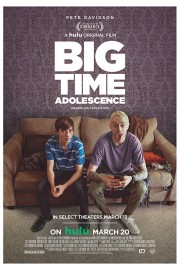Big Time Adolescence
“Big Time Adolescence” feels like a movie that should have some personal things to say about growing up, and the dynamic that arises when a teenager has a best friend who’s several years older than them. The script by writer-director Jason Orley, however, is as adolescent and surface as Zeke, the character played by Pete Davidson in this film. That means it is up to the personalities, and the situations, to win us over. Admittedly, there are times when the misadventures of Zeke and Mo, the 16-year-old protagonist of the film, are fun and entertaining. Too often, however, the film is slight and oh so predictable, and not really fun.
Almost immediately after Mo (Griffin Gluck), whose growth has been stunted, causing him to look younger than he really is, meets Zeke when he is going out with Mo’s sister, you can get a sense of precisely the direction this film is going to go. The relationship doesn’t last long with Mo’s sister, but Zeke and Mo remain friends. Mo feels validated by having an older guy who enjoys spending time with him, and Zeke likes having someone around who looks up to him. Zeke is not someone to look up to, however; he’s not inherently a BAD person, but he’s definitely a bad influence of someone like Mo, who is having a hard time fitting in with his peers. Zeke helps out with that with what he can offer Mo in terms of “guidance”; it’s not long before Mo is turning into a popular kid to have at parties, and girls are starting to notice him. His parents (Jon Cryer and Julia Murney) don’t seem to mind much, but dad is cautious- he’ll let Zeke spend time with Mo to the point where Mo’s life really goes downhill. You can probably imagine where that leads to.
This is a very standard coming-of-age comedy structure, as both the teenager and the older influence have some responsibility they need to learn. That, I feel like, is the ideal way for a film like this to work. Zeke is more of a cautionary tale for Mo rather than someone who grows, as well, and while that’s not a bad thing for a film like this, the only way that would work is if we are engaged by Zeke as much as we are by Mo. Personally, I wasn’t; it wasn’t exactly Davidson’s fault- he’s playing the character the way he should be played- but if there’s not an arc for Zeke to go through, as well, either he’s a strong comedic force on the film or he’s bringing the film down. Here, the film falls with Davidson. Gluck does a good job as Mo, but he’s a bit of a blank slate character, an archetype more than a flesh-and-blood individual, and that means Zeke is the strongest personality in the film. (Although Cryer does shine when given the chance to.) The result is a comedy that is slight, and has its moments, but- like its main characters- doesn’t have a sense of direction too often as it’s going along.










